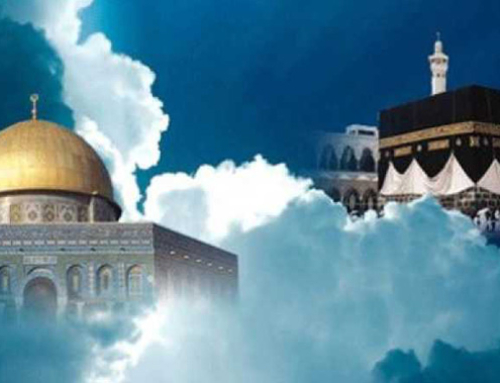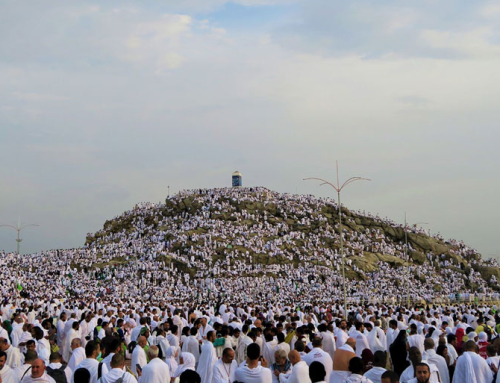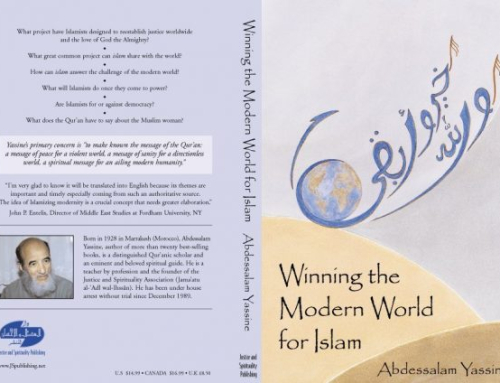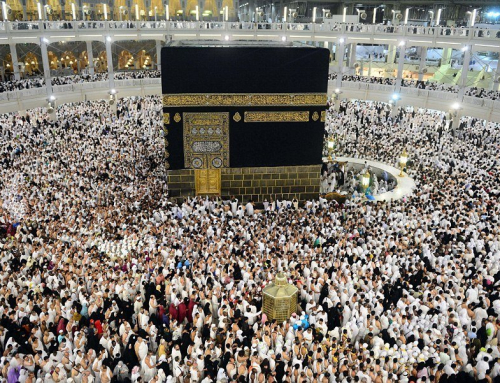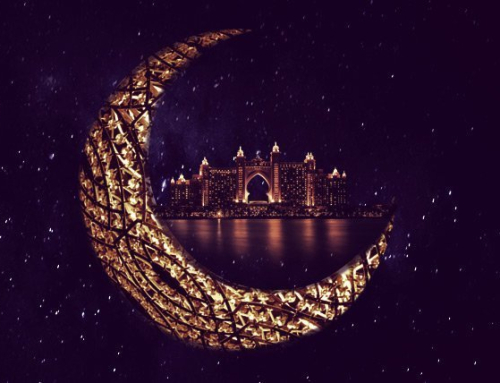Yassine Hicham
April 20, 2018
Islam is not logical and philosophical hair-splitting and rationalization: it is the generation of consequences and achievements through practical struggle. Therefore, Islam is not meant for opium addicts and lotus-eaters. It is meant for people who relish action and like to lead an active and meaningful life on earth. This is the point where Qur’anic guidance supersedes all other forms of knowledge on account of its emphasis on the practical and utilitarian aspects of human life. There is a great difference between Qur’anic knowledge and other philosophical concepts.
It is clear that the Qur’anic guidance is not just theoretical: it has its practical aspect as well, and greater emphasis is placed on its active dimension. The Qur’an indicates not only the identification of the target and the recognition of the purpose but also furnishes a practical course of action to realize the purpose, and the practical course is a guaranteed course which results in the actual achievement of the purpose. From this definite angle we can make a brief comparison between Qur’anic knowledge and other philosophical disciplines.
Ethics
Ethics deals with the nature of morals and morality, its value and standards. It tries to discover the logical basis of the validity of moral criteria and standards and also tries to justify its Excellence as a moral discipline. But Qur’anic knowledge formulates definitive answers to all these questions and discusses the relationship between moral standards of excellence and the practical mode of existence. If concepts are not translated into reality, they remain only concepts and are divorced from the world of practicality. Islam stresses the practical implications of this relationship and applies the moral criteria of excellence to the practical workaday life of ordinary human beings. Islam is the only philosophical system that tackles the problem directly: it handles the correlation between moral issues and their human repercussions without the least sense of evasion. This shows the determined posture of Islam as compared to other moral and ethical frameworks. The determination is backed by an unshakable confidence in the viability of its own moral system, a system that achieves an ideal synthesis between man’s theoretical tendencies and his practical compulsions.
Sociology
Sociology deals with the nature of society, its origin and the factors that contribute to social cohesion or social disruption. But Qur’anic knowledge recognizes all these social concepts and discusses their practical aspects. It introduces the element of convergence into the divergent chaos of social concepts and unifies their centrifugal diversity into one all-embracing concept which not only discusses their inherent irrelevance but offers a comprehensive practical solution to bind their sprawling unshapeliness into an effective and dynamic unity.
Political science
Political science deals with the nature and evolution of the state, it examines the formulation of various political systems and how they function within a specific geographical territory. Sometimes it occupies itself with a comparison of the different political structures and enumerates their merits and demerits, but it does not provide any positive guarantee for the smooth and tension-free functioning of any political system or it fails to provide constant fundamentals that are not twisted and distorted by the capricious tumbles and somersaults of human whims and moods. Consequently, the most viable political system sometimes reveals chinks and cracks under pressure and often completely collapses when it cannot resist the pressure of external forces. All these political systems are like glass houses whose fragile shells can be cracked with a pebble. But Qur’anic knowledge is far superior to the knowledge that has formed the structure of other political systems. It not only sorts out the differences between the ruler and the ruled, it not only believes in a steady egalitarian interaction between the people in authority and their subjects, and it not only ensures political justice to the people by eliminating the distinction between the off-scorings of humanity and those who are born with a silver spoon, between the scum of the state and the elite of the country, between the blue blood of the distinguished persons and the unsophisticated sweat of the ordinary working people, but it also recognizes the import of that national ideal which can transform the entire worrying and bickering society into a community which is free from external fears and internal worries. This is achieved through certain (invariable elements in Islam which are not subject to the fluctuations of human mood, and also through flexible elements which give reasonable latitude to human limitations. This ideal mixture of inflexibility and flexibility forms the basis of Islamic concept of social justice. While other systems waver and flicker in the unpleasant winds of hostile criticism, Islam has stood the test of time, and as a result of its steadfast message, it is being prescribed as the universal panacea throughout the world.
Economics
Economics deals with the economic nature and development of society. It is concerned with the distribution of wealth and the process of its expenditure. It also discusses the mutual balance and equilibrium between labor and capital. But Qur’anic knowledge not only makes but implements specific suggestions for an equitable distribution of wealth. Unlike the spurious development of other economies, Islamic economic system is based on the concept of general economic growth which eliminates the monopoly of certain individuals and groups of the economic sources of a society and ensures maximum freedom to both individual and society so that these two basic pillars of the economic system may work in harmony with one another. In this set-up the society functions independently in sincere pursuance of its objectives, and is not unnecessarily hampered or restrained by the wayward and mercurial behavior of its individuals. The individual in his turn gives free vent to his creative faculties and does not feel hamstrung by irrational economic pressures. The Qur’an, therefore, guarantees a kind of economic harmony in which the poor people do not suffer from a sense of deprivation and the rich do not experience euphoria that makes them a class apart. Their independence as well as inter-dependence generates an ideal economic system which caters to the balanced growth of both the society and the individuals who are its members.
Religious Studies
The subject of Religious Studies is primarily theoretical in its approach and orientation. It deals with the nature of faith and the qualification and quantification of good deeds and noble acts. It also debates the difference between desirable and undesirable convictions and actions and also discusses the consequences that spring from their omission or commission. Qur’anic knowledge first offers a determined solution of these problems and then discusses their philosophical implications. If the convictions have turned into superstitions, and the actions are replaced by dead rituals and there is no vital link between convictions and actions, The Qur’an suggests practicable ways and means to revitalize the dead link so that the creative relationship between them may be rehabilitated. This reestablishment of the vital connection for overhauling the social aspect of human beings and Qur’anic knowledge is basically revolutionary. It does not encourage stasis: it does not recognize dead-ends and blind alleys, it is the knowledge of light and luminosity. It cannot tolerate the discrepancy between desire and deed, intention and implementation. So Qur’anic knowledge strongly believes in reviving the flaked-out relationship between conviction and action, because without this revival and resuscitation, human society is reduced to a stinking morass. And Islam which is built on the rock of pure and fragrant faith can stand neither the jelly-like, slobbering appearance of dilute action nor the stink of putrefying faith.
The discussion makes it absolutely clear that all intellectual and philosophical disciplines follow a unilateral conceptual course. They are mainly concerned with the diagnosis and identification of problems and hesitate to offer solutions. At best they have come out with half-baked and quarter-cooked solutions. But Qur’anic discipline concerns itself with both aspects of the problem: its definition as well as its solution. After isolating the problem, Qur’anic knowledge spells out suggestions and prescriptions to solve the problems. Its procedure is both indicative and definitive. In Islam the mere identification of the problem is not enough: it is a prelude to the final achievement because Qur’an, unlike other half-chewed systems, places maximum stress on the realization of the problem and in this way it confirms its own superiority over other philosophical disciplines.
This is the reason when human beings are introduced to the purpose of their existence, they are first asked to identify the correct path that may lead them to the achievement of the purpose, and only afterwards they are asked to identify the purpose of their existence. This mode of questioning and diagnosis differentiates Qur’anic knowledge from all other forms of knowledge and attests its special status. The Qur’anic priorities are different from the priorities of other disciplines. It inverts the conventional scientific procedure through a transposition of accepted priorities and establishes its uniqueness as divine revelation. Scientists are great people but they are not greater than God. The Power of the Almighty God is simply inconceivable. Besides, human brain which is the greatest miracle in the human body, is God-given. Without this divine gift, the greatest scientific miracles would not have been achieved. The inversion of the usual procedure, therefore, reflects deep divine wisdom. God knows that scientists are genetically prone to theorization. The achievements of science are a paltry sum compared to the inexhaustible stacks of theory that have furnished the motive drive for these achievements. God, Being Omniscient, knows man’s capacity for infinite conceptualization and this is amply proved by the innumerable mazes of human thought and invention. Therefore, in order to establish the exceptionality of Qur’anic knowledge and also to emphasize its practicality, God has reversed the usual procedure. Therefore, through the Qur’an, the man who submits himself to the will of the Lord in a state of total humility, first requests God to guide him along the right direction because right direction is the only guarantee of right destination. A man may be aware of his destination, but if he does not follow the right path, he shall never arrive at his destination. He may probably flop down in the darkness of misdirection and lose both awareness of purpose and direction. Therefore, the Qur’an does not only signify the nature of the problem but also insists that human beings should seek divine guidance to find out a solution of the problem as well because theoretical guidance is both useless and inadequate without practical guidance.




